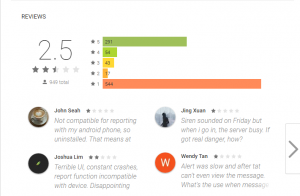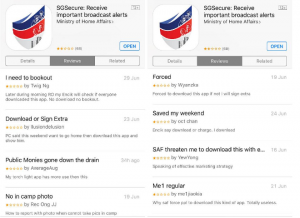
Articles
Editor’s Picks
Singapore’s Counter-Terrorism App and ELearning Initiative Has Officially Flopped
By Henry Kronk
October 21, 2017
This summer, members of Singapore’s armed forces were given a unique directive: everyone had to download a counter-terrorism app.
SGSecure, available for iOS and Android, seeks to “sensitise, train and mobilise Singaporeans to play a part to prevent and deal with a terrorist attack.”
In the event of an attack, the app will send out important messages to its users, allow citizens to connect to security forces, and enable witnesses to share video, photos, and text accounts with authorities.
The app also marks an attempt to train both servicepeople and the public to respond effectively to attacks via eLearning modules, which Singapore Armed Forces (SAF) personnel were required to complete.
It sounds like a good idea, but there’s a problem: the app stinks.
From the user interface (UI) design to compatibility on different devices, SGSecure has been a complete flop. It requires a hefty data usage and its servers can’t handle the payload.

User Jing Xuan reports, “[The] siren sounded on Friday but when I go in, the server [was] busy.”
“Terrible UI, constant crashes, report function incompatible with device,” says Joshua Lim. “Disappointing considering that citizens are recommended to install this app.”
“Seriously, you used 14MB of data just to show 2 alerts, both of which contain just a short paragraph of text?” asks Khairuddin Bin Ali. “What are you downloading/uploading that requires so much data? And don’t even get me started on how you need to turn on location to view the alerts.”
The Empire Strikes Back
Despite the poor performance, Singapore’s Ministry of Defense doubled down and tried for months to make it work.
When they required SAF personnel to download it this summer, many users reported they were coerced with punishment, withholding of pay and benefits, and extra duties.
“The management of SPF forced their officers to download, or be blacklisted, no consumption of leave and have your team leader nagging you 24/7 until you download on your phone,” wrote user Forced NPCO.

“[D]uring morning RO (Routine Order), my Encick will check if everyone downloaded this app,” wrote user Twig Ng. “No download no book-out.”
The Ministry of Defense appears to have countered with a PR campaign. Several positive stories appeared in Channel NewsAsia and The Straits Times between August and October.

One user left a positive comment on a Channel NewsAsia story, saying “Downloaded since the launch last year and voluntarily gave a five star rating.”
Several other readers responded to his comment with text-rendered animal noises, such as “Woof woof woof,” and “Baa Baa,” indicating that the poster had probably been domesticated.
Seeing the writing on the walls and the comment sections
Despite a strong effort by the Ministry of Defense to get all of Singapore using the app, the government agency finally caved this week, saying the app would no longer be compulsory for SAF personnel.
Defense Minister Ng Eng Hen, speaking in Parliament, said that “the SGSecure application is not a core part of the SAF’s counter-terrorism training package,” according to Today.
The counter-terrorism eLearning initiative, furthermore will take place off the app as well.
The SAF will implement “eLearning including through websites to better equip all Mindef and SAF personnel, including NSFs for training in counter-terrorism.”
“The eLearning training program is structured to be comprehensive with a number of modules to be rolled out progressively.”
He also added, “making it compulsory is neither an enlightened approach nor effective to facilitate learning.”
Poor design can kill a great idea
A recent survey conducted by the Linx International Group found that a majority of security personnel identified counter-terrorism as a field in which they would like to receive more training.
Over half also revealed that they had paid for further training to both equip them with the skills to respond to security threats and advance their careers.
What’s more, the survey indicated that eLearning-based training was growing in popularity. Some 60% of respondents had undergone some kind of eLearning and 70% said they planned to do so in the future.
“There is a clear trend,” said Linx Group Training Director Ken Livingstone, “towards upskilling and individuals taking responsibility for their own career development, as well as demand from industry for better qualified, certified and accredited professionals.”
The CGSecure case highlights an interesting conclusion: even when there’s industry demand, government funding, and user interest, poor design can completely kill any eLearning initiative.









No Comments